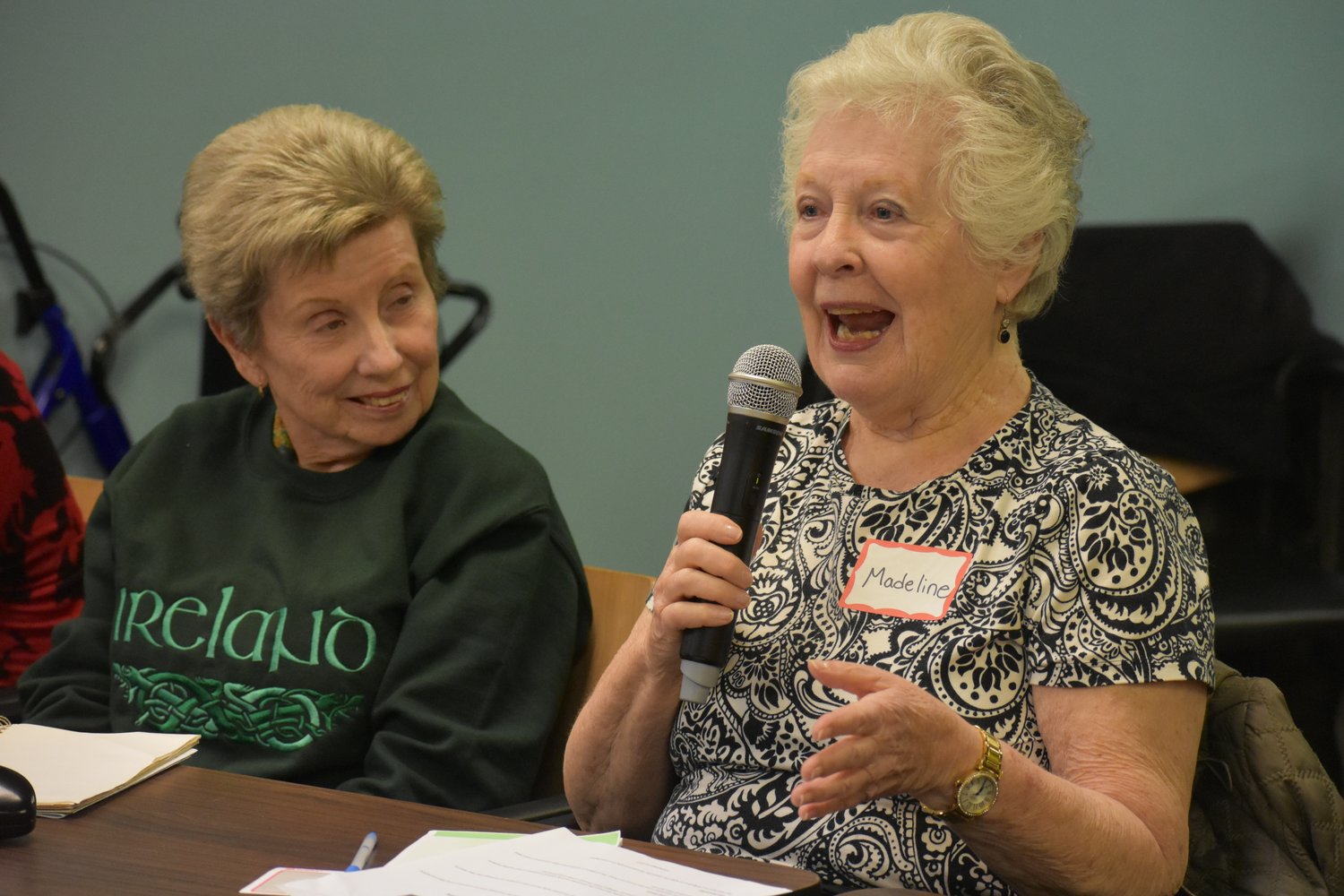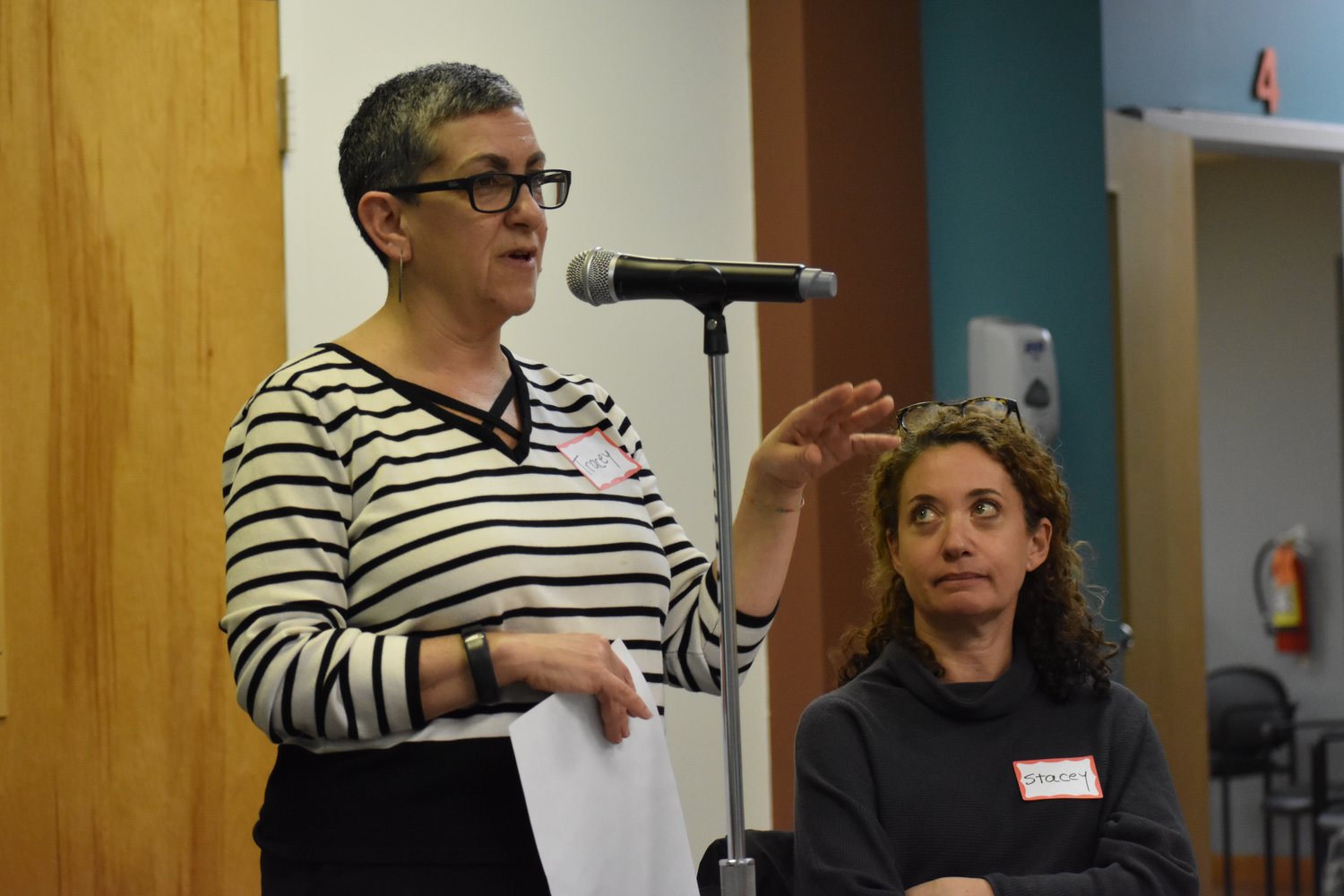Tuesday, April 16, 2024
 54.0°,
Fair
54.0°,
Fair
Rockville Centre seniors to take stage after storytelling workshop series
Award-winning storyteller hones skills of others to share their experiences
“You’re going to tell it from your heart,” Tracey Segarra told attendees at a storytelling workshop series at the Sandel Senior Center last month. “The best stories are told from the heart.”
Segarra, an award-winning storyteller, has been offering advice to Rockville Centre seniors as part of the free series of five sessions, intended to teach participants the basics of effective storytelling by using fun exercises to help uncover their own stories. The techniques learned throughout the program are set to be on display during a final event on April 15 at 6 p.m., during which the seniors’ families and friends will be invited to attend.
“I love these people, and I fall in love with their stories,” Deputy Mayor Kathy Baxley, who serves as the village board’s liaison to the center, said of the Sandel seniors. The idea was born to facilitate a storytelling workshop, and a donor, who wished to remain anonymous, funded the sessions.
After years of collecting and cataloguing stories of her life, Segarra began listening to the Moth Radio Hour on National Public Radio, and realized there was a place to share them. At a Moth StorySLAM in New York City in 2015, she told a personal story live on stage for the first time, about becoming pregnant after a miscarriage. At 14 weeks pregnant, she happily went to discover the sex of the baby, only to hear from her doctor that the baby had serious defects, and would not survive. She shared the experience of giving birth to a lifeless baby and the guilt she felt about previously being addicted to drugs and alcohol. But 18 months later, she gave birth to twin girls and would take a photo of them each year with a cherry tree, which she planted in memory of the baby that did not live.
Segarra, who grew up in Freeport and Great Neck and now lives in Hewlett, won the competition that night, and has since won two other Moth StorySLAMs. In June 2016, Tracey launched her own storytelling show on Long Island, “Now You’re Talking,” and later that year she was named the mid-Atlantic board member for the National Storytelling Network.
Though she leads the marketing department of a Garden City accounting firm by day, she loves teaching others how to best tell their stories, encouraging them to focus less on what happened, and more on how it affected them. “I think a lot of times people don’t even realize the impact of their stories on their lives,” she said. “. . . If we don’t capture these stories, they’ll be lost.”
At the second session at the Sandel Center on March 18, Segarra stressed the importance of being brave and vulnerable. “The best stories are not where we’re the hero, but we did something maybe we’re not so proud of,” she said. “. . . We all have those moments and most people don’t talk about them, so when we open ourselves up and let people see the parts of our lives where we’re vulnerable, it really has an impact.”
That night, Segarra brought along a friend, fellow Moth StorySLAM winner Stacey Bader Curry, who told the Sandel seniors about the time she got a penny-farthing bicycle from her father, when all she wanted was a dirt bike. She hid the bicycle away, embarrassed to ride it, until bringing it to college years later to show off its charm to interested friends.
“He gave me something else that no other kid in the world had,” Bader Curry said, “and for the first time in my life, I really appreciated having something that was so different.”
On the subject of bicycles, Madeline Kelly, a Sandel member, shared that she grew up as a city girl always wanting a bike, but her parents said they couldn’t afford one. When her aunt won one in a lottery at an A&P, the largest grocery retailer in the United States from 1915 to 1975, she offered it as a gift to Kelly and her sister.
“I’m dancing around the living room . . . and my mother says ‘No,’” Kelly recalled. As it turned out, her mom didn’t want her to have a bicycle because she believed it was too dangerous. “When I was married eventually, one of the first things I did was buy myself a two-wheel bike,” she added, and the room of about a dozen seniors broke out in applause.
Chris O’Leary, director of the Sandel Senior Center, noted that storytelling can offer health benefits to older adults, and can refresh their sense of meaning and purpose. She called the seniors’ stories over the course of the workshop “thoughtful, funny and poignant,” and hopes to encourage others to participate in future programs like it by broadcasting the April 15 event on the village’s cable television channel.
“I love being able to help pull the stories out of people,” Segarra said. “. . . Storytelling is just such a wonderful way to communicate.”
HELP SUPPORT LOCAL JOURNALISM
The worldwide pandemic has threatened many of the businesses you rely on every day, but don’t let it take away your source for local news. Now more than ever, we need your help to ensure nothing but the best in hyperlocal community journalism comes straight to you. Consider supporting the Herald with a small donation. It can be a one-time, or a monthly contribution, to help ensure we’re here through this crisis. To donate or for more information, click here.
Sponsored content
Other items that may interest you







